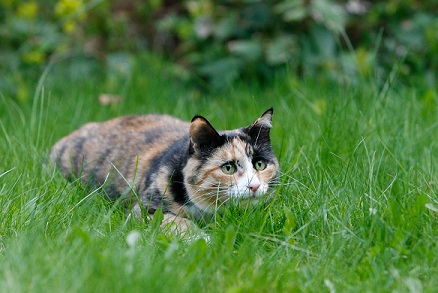
Arthritis is very common in pet cats, in fact it is estimated that 50% of cats over the age of 10 are affected. Unfortunately it is easy to miss in cats, as they are excellent at hiding any signs of a problem.
What is arthritis and what causes it?
Arthritis is a painful disease of the joints. Osteoarthritis, or Degenerative Joint Disease, is the most common type in cats – this is the result of excessive wear and tear on the joints that can be caused by a number of factors. In cats, the most commonly affected joints are the shoulders, hips, elbows, knees and ankles.
Older animals are more prone to arthritis, due to the additional years of wear and tear on the joints. Obesity in pets is a growing problem, and this increases the chance of a pet developing arthritis at an earlier age. In cats osteoarthritis can result from fractures, developmental problems e.g. hip dysplasia, and ligament injuries e.g. cruciate ligament injury.
Signs of arthritis
Unlike dogs, cats rarely limp or show obvious signs of pain. Signs may include:
-
- Reluctance, hesitance or refusal to jump up or down
- Jumping up to lower surfaces than previously
- Difficulty going up or down stairs
- Difficulty using the litter tray, which can result in inappropriate toileting in the house
- Difficulty going through the cat flap, which can mean they spend less time outside
- Increased time spent resting or sleeping
- Reduced interaction and playing less
- Difficulty grooming, which can lead to a matted or poor coat
- Overgrown claws, if unable to scratch effectively
International Cat Care have produced a ‘mobility check list’ which you can download from here to use to see if there have been any changes in your cat that may be indicative of arthritis or joint pain. Just hand in your completed form or e-mail it to us at info@greenbayvets.co.uk and one of our vets will take a look.
What can we do to help a cat with arthritis?
Non medical options:
- Weight management. This is vital to successfully managing arthritis and weight loss alone in an overweight cat can cause a dramatic improvement in their mobility. We run free nurse weight clinics where the nurse will weigh and measure your cat regularly and advise regarding diet and exercise. There are a fantastic range of diets which are specially formulated to aid weight loss
- Home management. Changes at home can make a huge difference to arthritic cats e.g. provision of ramps or steps so they can get to their preferred places; modifying the litter tray and cat flap to allow easy access; making sure food, water, litter tray and hiding places are all available on one level of the house. The cat may also benefit from grooming and having their nails trimmed.
- Food. There are prescription foods e.g. Hills j/d, which is clinically proven to improve mobility. Ask one of our team about the best option for your cat. As part of our arthritis awareness campaign we are offering 25% off your first bag of Hills j/d during September and October 2018. Our Hills food range is covered by a palatability guarantee so if your cat doesn’t like it you can return it for a refund, and we also have an ongoing loyalty discount scheme.
- Alternative therapies. These include physiotherapy, therapeutic laser therapy and acupuncture. Our vets can advise as to which of these may benefit your cat.
Medical options:
- Many cats show a dramatic improvement when put onto pain-killers and/or anti-inflammatories to manage their arthritic pain. The most common ones we use are NSAIDs (non-steroidal anti-inflammatory drugs), with both liquid and tablet forms available. It is important not to give your cat human medications, as some can be toxic for them. These drugs can be used long-term in cats with careful monitoring.
Surgery:
- For some conditions surgery may be an option e.g. hip replacement or stabilisation of a ruptured cruciate ligament.
To book your cat in for a check-up with a vet please call 01803 606059 (Torquay) or 01803 834836 (Paignton), or book online. Our nursing team are also happy to advise about weight, diet, supplements and home management by phone, or in person.
